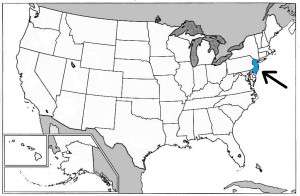Why New Jersey Legalizing Online Gaming is a Big Deal
 The news yesterday that New Jersey has become the third state to legalize online gambling left some non-New Jersey residents shrugging their shoulders. Although the legislation doesn’t require players to be residents of New Jersey, it does require them to be physically present in New Jersey in order to play. The natural response of players outside of New Jersey, then, is, “So what?”
The news yesterday that New Jersey has become the third state to legalize online gambling left some non-New Jersey residents shrugging their shoulders. Although the legislation doesn’t require players to be residents of New Jersey, it does require them to be physically present in New Jersey in order to play. The natural response of players outside of New Jersey, then, is, “So what?”
There are three main reasons why the rest of the country should take notice.
First, while New Jersey isn’t a large-population state like California, it also isn’t a small-population state like Nevada or Delaware. With close to 9 million people living within its borders (and another 10.5 million in nearby Philadelphia and New York City), New Jersey is the first state to pass online poker legislation that could conceivably make a go of it with interstate player sharing. A natural analogy is to Sweden (pop. 9.4 million), which has had a robust online gaming industry for several years.
New Jersey is thus a much more important litmus-test for the viability of regulated online gaming in the United States than Delaware, which doesn’t even have a million residents, or Nevada, which has only 3 million residents and most of the country regards as a curiosity due to its long-standing acceptance of gambling and general libertarian bent.
The second point follows from the first. As a medium-population state that isn’t intrinsically known for gambling, New Jersey could represent a tipping point for the ratification of online gaming laws in other states. As other states see non-gaming jurisdictions making an online gaming grab, they may want a piece of that pie for themselves. Delaware, Nevada and New Jersey can lead the way in providing a regulatory framework that will ensure fair games and provide revenue to state governments.
A certain minimum threshold of player liquidity is necessary to make online gaming viable. The more states that enact online gambling laws, the more player liquidity there is to be had between states via player-pooling agreements. Could some states choose to go their own way without player-sharing? A few, yes. But the downsides to player-pooling are few, so this is a case of “the more, the merrier”.
States that are currently considering bills include Iowa (pop. 3.0 million), Massachusetts (6.6 million), Hawaii (1.4 million) and California (38.0 million). Already we’ve seen Nevada, Massachusetts and California advance pending bills in response to New Jersey’s actions over the last few weeks. To date only Nevada has actually enacted any, but there is cause for optimism in Massachusetts and California.
The final reason is this: online gaming’s legislative success in New Jersey shows that these types of bills can be enacted where there’s the willpower to do so. It wasn’t an easy fight in New Jersey. Twice the governor vetoed bills that the state legislature passed. This success is a standard-bearer for the rest of the online poker movement in the United States, including at the federal level, where efforts have been stalled for years.
Does it guarantee success in any other jurisdictions? Obviously not. But when you’ve been beating your head against a door for years, hoping it will one day open, it’s easy to become discouraged and to lose faith. Success in New Jersey should give hope to efforts in other states that they, too, will one day see fully legal and regulated online poker.




















COMMENTS